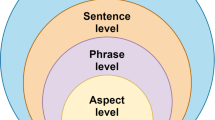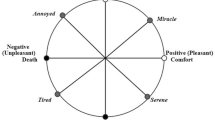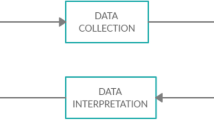Abstract
Aspect-based sentiment analysis (ABSA) includes two sub-tasks namely, aspect extraction and aspect-level sentiment classification. Most existing works address these sub-tasks independently by applying a supervised learning approach using labeled data. However, obtaining such labeled sentences is difficult and extremely expensive. Hence, it is important to solve ABSA without taking a dependency on labeled sentences. In this work, we propose a three-step semi-supervised hybrid approach that jointly detects an aspect and its associated sentiment in a given review sentence. The first step of our approach takes a small set of seed words for each aspect and sentiment class to construct respective semantically coherent class vocabularies. The second step makes use of these constructed vocabularies along with POS tags to label a subset of sentences from the training corpus. As we adopt a semi-automated approach to label the data, this process may induce noise in the labels during the annotation. In the last step, we use such labeled sentences to build a noise-robust deep neural network for aspect and sentiment classification. We conduct experiments on two real data sets to verify the effectiveness of our model (https://github.com/Raghu150999/UnsupervisedABSA).





Similar content being viewed by others
References
Hu M, Bing L (2004) Mining and summarizing customer reviews. In: Proceedings of the tenth ACM SIGKDD international conference on Knowledge discovery and data mining, pp 168–177
Liu B, Lei Z (2012) A survey of opinion mining and sentiment analysis. In: Mining text data, pp 415–463. Springer
Pontiki M, Dimitrios G, Haris P, Ion A, Suresh M, Al-Smadi M, Al-Ayyoub M, Yanyan Z, Bing Q, De Clercq O, et al (2016) Semeval-2016 task 5: aspect based sentiment analysis. In: 10th international workshop on semantic evaluation (SemEval 2016)
Guang Qiu, Liu Bing Bu, Jiajun Chen Chun (2011) Opinion word expansion and target extraction through double propagation. Comput Linguist 37(1):9–27
Blei DM, Ng AY, Jordan MT (2003) Latent dirichlet allocation. J Mach Learn Res 3(Jan):993–1022
Brody S, Noemie E (2010) An unsupervised aspect-sentiment model for online reviews. In Human language technologies: the 2010 annual conference of the North American chapter of the association for computational linguistics. Association for Computational Linguistics, pp 804–812
Wayne Xin Z, Jing J, Hongfei Y, Xiaoming L (2010) Jointly modeling aspects and opinions with a maxent-lda hybrid. In: Proceedings of the 2010 conference on empirical methods in natural language processing. Association for Computational Linguistics, pp 56–65
Zhiyuan C, Arjun M, Bing L (2014) Aspect extraction with automated prior knowledge learning. In: Proceedings of the 52nd annual meeting of the association for computational linguistics (vol 1, long papers), pp 347–358
Miao Y, Lei Y, Phil B (2016) Neural variational inference for text processing. In: International conference on machine learning, pp 1727–1736
Akash S, Charles S (2017) Autoencoding variational inference for topic models. arXiv preprint arXiv:1703.01488
Ming L, Jing L, Haisong Z, Lingzhi W, Xixin W, Kam-Fai W (2019) Coupling global and local context for unsupervised aspect extraction. In: Proceedings of the 2019 conference on empirical methods in natural language processing and the 9th international joint conference on natural language processing (EMNLP-IJCNLP), pp 4571–4581
He R, Wee Sun L, Hwee Tou N, Daniel D (2017) An unsupervised neural attention model for aspect extraction. In: Proceedings of the 55th annual meeting of the association for computational linguistics (vol 1, long papers). Association for Computational Linguistics, Vancouver, Canada, pp 388–397
Tulkens S, van Cranenburgh A (2020) Embarrassingly simple unsupervised aspect extraction. In: Proceedings of the 58th annual meeting of the association for computational linguistics. Association for Computational Linguistics, pp 3182–3187 (Online, July 2020)
Mikolov T, Kai C, Greg C, Jeffrey D (2013) Efficient estimation of word representations in vector space. arXiv preprint arXiv:1301.3781
Wang L, Kang L, Zhu C, Jun Z, De Melo G (2015) Sentiment-aspect extraction based on restricted boltzmann machines. In: Proceedings of the 53rd annual meeting of the association for computational linguistics and the 7th international joint conference on natural language processing (vol 1, long papers), pp 616–625
Aitor G-P, Montse C, German R (2018) W2vlda: almost unsupervised system for aspect based sentiment analysis. Exp Syst Appl 91:127–137
Jiaxin H, Meng Y, Fang G, Heng J, Jiawei H (2020) Weakly-supervised aspect-based sentiment analysis via joint aspect-sentiment topic embedding. arXiv preprint arXiv:2010.06705
Devlin J, Ming-Wei C, Kenton L, Kristina T (2018) Bert: pre-training of deep bidirectional transformers for language understanding. arXiv preprint arXiv:1810.04805
Xu H, Bing L, Lei S, Yu Philip S (2019). Bert post-training for review reading comprehension and aspect-based sentiment analysis. arXiv preprint arXiv:1904.02232
He R, Wee Sun L, Hwee Tou N, Daniel D (2018) Exploiting document knowledge for aspect-level sentiment classification. In: Proceedings of the 56th annual meeting of the association for computational linguistics. Association for Computational Linguistics
Angelidis S, Mirella L (2018) Summarizing opinions: aspect extraction meets sentiment prediction and they are both weakly supervised. CoRR, abs/1808.08858
Karamanolakis G, Daniel H, Luis G (2019) Leveraging just a few keywords for fine-grained aspect detection through weakly supervised co-training. In: Proceedings of the 2019 conference on empirical methods in natural language processing and the 9th international joint conference on natural language processing (EMNLP-IJCNLP). Association for Computational Linguistics, Hong Kong, China, pp 4611–4621
Xu X, Songbo T, Yue L, Xueqi C, Zheng L (2012) Towards jointly extracting aspects and aspect-specific sentiment knowledge. In: Proceedings of the 21st ACM international conference on information and knowledge management, CIKM ’12. Association for Computing Machinery, New York, NY, USA, pp 1895–1899
Zhao X, Jiang J, Hongfei Y, Xiaoming L (2010) Jointly modeling aspects and opinions with a MaxEnt-LDA hybrid. In: Proceedings of the 2010 conference on empirical methods in natural language processing. Association for Computational Linguistics, Cambridge, MA, pp 56–65
Wang L, Kang L, Zhu C, Jun Z, de Melo G (2015) Sentiment-aspect extraction based on restricted boltzmann machines. In: Proceedings of the 53rd annual meeting of the association for computational linguistics and the 7th international joint conference on natural language processing (vol 1: long papers). Association for Computational Linguistics, Beijing, China, pp 616–625
Zhuang H, Fang G, Chao Z, Liyuan L, Jiawei H (2020)Joint aspect-sentiment analysis with minimal user guidance. In: Proceedings of the 43rd international ACM SIGIR conference on research and development in information retrieval, SIGIR ’20. Association for Computing Machinery, New York, NY, USA, pp 1241–1250
Honnibal M, Ines M, Van Landeghem S, Adriane B (2020) spaCy: industrial-strength natural language processing in python
Zhang Z, Sabuncu Mert R (2018) Generalized cross entropy loss for training deep neural networks with noisy labels. arXiv preprint arXiv:1805.07836
Tulkens S, van Cranenburgh A (2020) Embarrassingly simple unsupervised aspect extraction. arXiv preprint arXiv:2004.13580
Kingma Diederik P, Jimmy B (2014) Adam: a method for stochastic optimization. arXiv preprint arXiv:1412.6980
Conneau A, Kartikay K, Naman G, Vishrav C, Guillaume W, Francisco G, Edouard G, Myle O, Luke Z, Veselin S (2019) Unsupervised cross-lingual representation learning at scale. arXiv preprint arXiv:1911.02116
Funding
All authors certify that they have no affiliations with or involvement in any organization or entity with any financial interest or non-financial interest in the subject matter or materials discussed in this manuscript.
Author information
Authors and Affiliations
Corresponding author
Ethics declarations
Conflict of interest
The authors declare that there is no conflict of interest regarding the publication of this paper.
Additional information
Publisher's Note
Springer Nature remains neutral with regard to jurisdictional claims in published maps and institutional affiliations.
Rights and permissions
About this article
Cite this article
Kumar, A., Gupta, P., Balan, R. et al. BERT Based Semi-Supervised Hybrid Approach for Aspect and Sentiment Classification. Neural Process Lett 53, 4207–4224 (2021). https://doi.org/10.1007/s11063-021-10596-6
Accepted:
Published:
Issue Date:
DOI: https://doi.org/10.1007/s11063-021-10596-6




